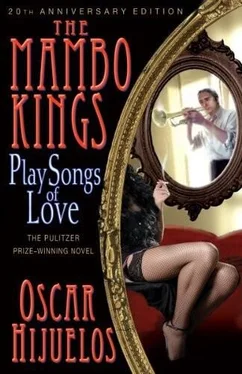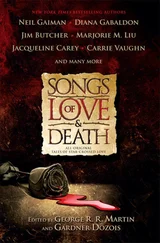Now the medicines, the tubes, the blinking machines, the pretty nurses, and the doctor again:
“You have all the signs of systemic failure. Your kidneys, your liver are all going. Keep up your drinking and you’ll end up in the morgue. I’m sorry to be so blunt, but that’s the truth.”
“Is it that bad?”
“Yes.”
“Thank you, Doctor.”
IT HAD BEEN OVER FIFTY YEARS ago in Cuba when he was in school, he told himself, that his teacher, Señora Ortiz, would make him fill pages and pages of newsprint scraps with additions and subtractions, because he used to use an odd, contrary logic when it came to numbers — for example, writing 3 + 3 = 8, simply because the numbers were round-bottomed like an 8. She’d send him out to count things and add them up, and so he’d find himself in town counting the houses (one hundred and twenty-eight) and the number of horses on a given street (seven tied up to porch railings on Tacón), and once he even tried to count the number of yellow hibiscus in a field, losing track and falling asleep on the soft ground after two hundred or so — a beautiful day.
And nearly fifty years since he’d first mounted a stage to sing.
And nearly forty years since he’d been married.
Then thirty-one years since leaving Havana.
How many thousands of cigarettes had he smoked? How many leaks had he taken? Belches? Fucks, ejaculations? How many times had he ground his hips into a bed, with an erection, thinking that the mattress was a woman and waking with the insides of his underwear damp?
Remembered trying to count the stars one night while lying on his back in a field in Cuba when he was a kid hiding from his father, and feeling as if the Milky Way was going to swallow him. He stared so long and lost count so many times that he began to feel faint-headed.
In his own way, he wanted to be someone significant.
How many drinks had he had that night?
He figured a dozen, full, hearty glasses, as they might say in one of the ads.
He did more figuring. Bottles of rum and whiskey, enough to fill a warehouse, all turned into piss. He’d consumed enough food and left the world enough shit to fill Fort Knox. (Behind this, the memory of being seized with cramps on the road outside Cleveland, so badly they had to stop the Mambo King bus so he could crouch low in the grass and relieve himself, with trucks and cars whizzing by.)
Endless numbers of cigarettes.
A million smiles, pinches on nice female bottoms, tears.
Women telling him like Vanna Vane used to, “I love you,” and he’d say, “Yes, I feel it,” or “And I love you, baby.”
And for what?
And how many times had he knelt in church as a kid praying? Or whispered as he slept, “Oh, God,” or “Jesus Christ”? Or had watched a woman’s face contort with pleasure and heard her crying out, “Jesus, Jesus, Jesus”?
His life was much more beautiful when he believed that a benevolent angel walked behind him.
Twenty-three years since Nestor had left the world. He still had the funeral card, tucked among the letters and other things that he had brought with him that night.
SOMETIMES WHEN THE MUSIC got faster, he would feel like a kid running up and down the steep and beautiful stairways of Santiago de Cuba. Sometimes a fast song took him far from the Bronx to Nueva Gerona, to El Valle de Yumurí, and to the mountains of Escambray, took him strolling through the city of Matanzas, threw him into the waters off the Hanabanilla falls in Las Villas, placed him on a sorrel crossing the tranquil valley of Viñales in Pinar del Río, left him perching on the ledge of a mountain cave in Oriente, peering out over the winding Río Cauto. The music set him leaning drowsily under the shade of a bottle-palm tree in Holguín. Late in the night he returned to a street in Santiago he had not thought about for years, with its narrow, two-story houses with slanting tin roofs and high-shuttered windows, palm trees and bushes and wildflowers that went flowing over the walls. He found himself standing atop a stairway, looking down, three flights below, to a small park, flowers and bushes surrounding a fountain, and in the place of honor a heroic bust. On a bench, a pretty girl in a short-sleeved polka-dot dress, reading a newspaper. The Mambo King, sixteen years old, walking toward her, the Mambo King nodding and smiling, the Mambo King sitting beside her.
“It’s a beautiful day, isn’t it?”
“Yes.”
“Would you like to go dancing later?”
“Yes.”
And the music redrew the blue cloudless sky and the sun rolled like a ball across his room in the Hotel Splendour, red and purple streaks across the room, and he heard the heavy bronze bells of the cathedrals of Santiago and Havana ringing simultaneously, he heard the tttling-tttling of a bicycle and blinked and saw the Havana night, shoots of light in the sky, a thousand trumpets and drums in the distance, cars honking, and the low murmur, like an ocean, of nighttime crowds.
He was running now past La Casa Potín, the Surtida Bodega, and the good bakery smells of La Gran Vía!
A drink in the Pepe Antonio Café with some musician pals, circa 1946; a fuck with a woman he met while strolling along, window-shopping on Obispo, what an ass on that dame, my, but how she smelled nicely of sweat and Candado soap, and her nipples were taut, brown, and smooth as glass beads. What good days, catching Beny More up at that club, La Palma, at Jibacoa beach, or heading down the Paseo del Prado with his brother Nestor toward La Punta off the Malecón, the harbor drive, to catch the ferryboat over to Guanabacoa, the two of them leaning on the railing, checking out the pretty girls. In a creaseless guayabera, he lowers his dark glasses so that this one dish, in a sailor’s blouse and a tight white skirt, slit riding high, could get a good look at his killer-green eyes. Inhalation of the sea, sun warming their faces, tour boats in the harbor, clanging buoys. And then they’re climbing the stairway up to a nice little seafood restaurant, El Morito, with its pink walls, tin roof, and shaded balcony overlooking the love-enriching sea, and they devour a pot of yellow rice cooked in chicken broth and beer, thick with shrimp, scallops, oysters, mussels, clams, olives, and red peppers. The day’s so tranquil, where did it go, so tranquil they’re feeling lazy as seagulls.
Sometimes when he closed his eyes he saw himself as a little kid sitting in the front row of the small movie theater in their town, watching the stony-faced Eusebio Stevenson leading the musicians of his pit orchestra through tangos, rumbas, and foxtrots, which they played as background to the silent films of Tom Mix, Rudolph Valentino, Douglas Fairbanks, Jr., and so many others who galloped, danced, and swashbuckled. The future Mambo King leaning forward to watch the black man’s whorl-knuckled hands, gray in the cinema light, stretching, stretching across the keyboard. Later, he remembers, he’d followed the man out into the street and to a little café on the corner, where he would sit at a table in the back, quietly eating his chuletas and rice and beans, the kid waiting for him and watching Eusebio bolt down one brandy after another, drinking until a certain lightness entered Eusebio’s hard expression and he would make his way out into the street, Cesar Castillo following after him and pulling on his jacket, begging him, “Can you show me how you make those notes?” and keeping up with his zigzag motions (And who does this remind you of, hombre?) as he weaved down the cobblestone streets, muttering, “Leave me alone, kid. You don’t want this life,” and waving the future Mambo King away. But he kept saying, “Please, please, please,” that being one of the few times in his life that the Mambo King, even as a child, began to cry.
Читать дальше












